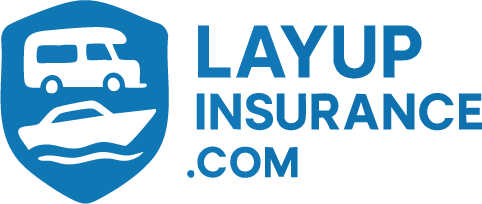New to Layup Insurance?
Understanding seasonal coverage without the stress
We get it!. Insurance terms can feel overwhelming, especially when your vehicle is off the road and stored for the season. That’s why we created this plain-language glossary of common storage and layup insurance terms, with clear definitions and real-world examples. Our goal is to help you feel confident, not confused.
Whether you're storing an RV, boat, classic car, or motorcycle, this guide will help you understand your options and make smarter coverage decisions so your vehicle is protected, even when it’s not moving.
Coverage and terms may vary. Always review your individual policy or speak with a licensed insurance agent.
Definition: A special type of insurance that provides limited coverage for vehicles (like boats, RVs, or classic cars) that are stored and not being used for a period of time.
In Plain English: A cheaper insurance plan you use when your vehicle is off the road and just sitting in storage.
Definition: Coverage that protects your stored vehicle against non-driving risks such as fire, theft, or vandalism while it’s not being driven.
In Plain English: Insurance that covers your vehicle when it’s parked for the season, not being driven.
Definition: Insurance that protects against damages not caused by a collision, like theft, fire, natural disasters, or animals.
In Plain English: Covers things like storms, break-ins, or rodent damage, not crashes.
Definition: Insurance that pays for damage to your vehicle if you hit another car or object.
In Plain English: Pays for repairs if you crash into something, usually turned off in layup mode.
Definition: Temporarily pausing parts of your insurance (like liability and collision) while keeping basic protections active.
In Plain English: Turning off parts of your insurance while your vehicle is parked to save money.
Definition: A value you and the insurance company agree on for the vehicle’s worth before a loss occurs.
In Plain English: A pre-set dollar amount you’ll be paid if your vehicle is totaled.
Definition: The amount your vehicle is worth today, after subtracting depreciation.
In Plain English: What your car or boat would sell for right now, not what you paid for it.
Definition: The amount you pay out of pocket before your insurance covers the rest of a claim.
In Plain English: Your share of the cost before your insurance kicks in.
Definition: Situations or damage types that your insurance policy does not cover.
In Plain English: What your policy won’t pay for, make sure you read the fine print.
Definition: A written add-on to your insurance policy that changes or adds specific coverage.
In Plain English: A tweak or upgrade to your policy, like adding rodent damage protection.
Definition: Damage caused by rats, mice, or other pests chewing wires or upholstery—common in stored vehicles.
In Plain English: When mice chew your wires or seats while your vehicle is in storage.
Definition: Intentional damage caused by someone else, like broken windows or spray paint.
In Plain English: Someone messing with your stored vehicle on purpose.
Definition: Coverage that pays for damage caused by accidental fires while your vehicle is stored.
In Plain English: Helps you recover if your vehicle burns while in storage.
Definition: Insurance for vehicles not currently registered or driven on public roads.
In Plain English: Covers your RV, classic car, or boat while it’s parked, not moving.
Definition: A vehicle only used during part of the year, like summer or vacation months.
In Plain English: Something you only drive part-time, like a boat or motorhome.
Definition: A formal request you file with your insurer after damage or loss, asking them to pay.
In Plain English: Telling your insurance company something happened and asking for money.
Definition: The steps you follow after damage: report the issue, submit evidence, and receive payment.
In Plain English: What you do after something bad happens to get your claim paid.
Definition: Insurance that pays for your vehicle or belongings if they’re stolen.
In Plain English: Pays you back if your stored vehicle or stuff inside gets stolen.
Definition: Insurance that pays if you’re legally responsible for injury or damage to someone else.
In Plain English: Covers you if you hurt someone or damage property—but not always included in layup policies.
